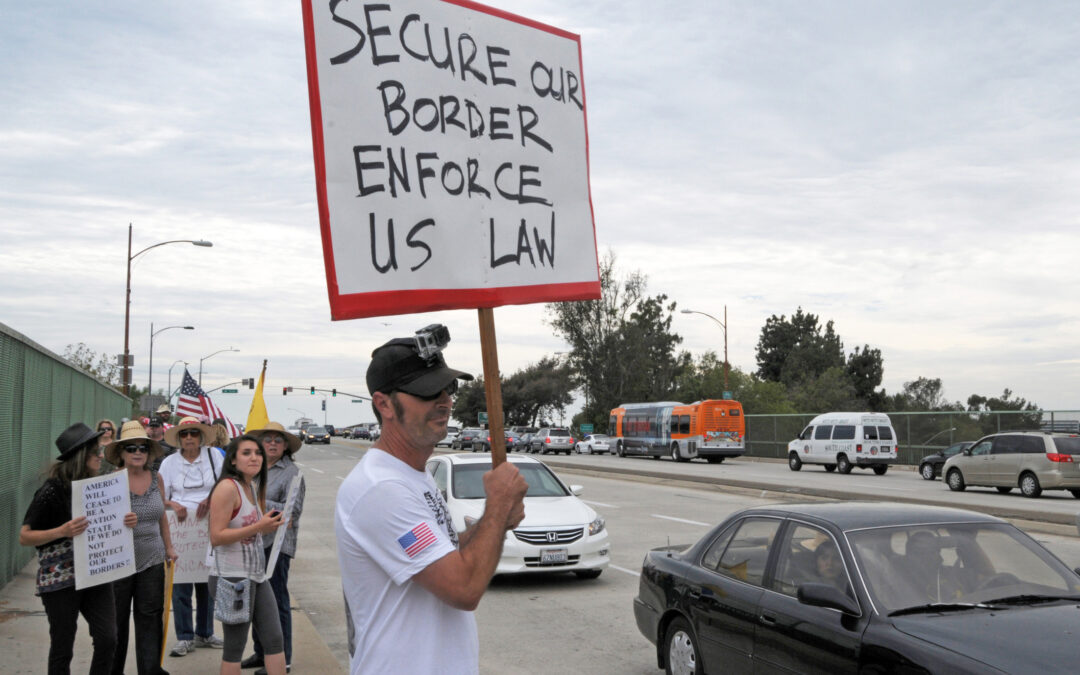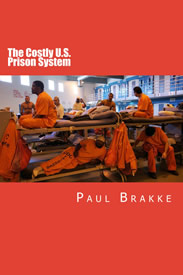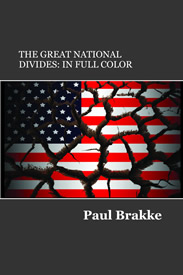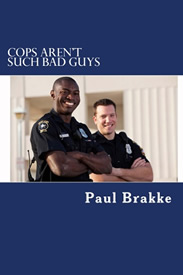FOR IMMEDIATE RELEASE
The global immigration crisis is very real and has the potential to destabilize countries around the world, although liberals try to paint any country leaders trying to protect their country as insensitive and even evil. This effort by liberals has led to a growing barrage of attacks on the Trump administration for its harsh policies to crack down on immigration on its Southern border.

As part of these attacks, there have been photos and stories of the suffering faced by immigrants who have been caught trying to sneak into the United States. There have been stories about children separated from their parents and the terrible conditions for the immigrants coming from Mexico and all of South America. And the President’s proposal to build a wall has met with outright derision, as if it was the only strategy, rather than one of many methods to stem the immigration tide.
However, as criminal justice expert Paul Brakke, author of Dealing with Illegal Immigration and the Opioid Crisis and a chapter on the immigration crisis in Crime in America, points out, the huge influx of immigrants seeking entry to wealthier countries is a serious risk. Accordingly, it is important not to let the sympathetic portraits of individual immigrants who have suffered in their home country and in their journey to America undermine the serious danger to the U.S. if immigration policies are not tightened.
As Brakke points out, the battle over immigration to America is part of a global crisis in which there are more migrants than ever. This require new regulations to deal with the hordes that could upend the economy, as well as keep out the criminals, including drug dealers, who are seeking refuge in America. A big problem, says Brakke, is that the old laws protecting immigrants have become obsolete in light of the crisis.
“Back in 1951, the United Nations established some definitions and regulations for refugees and asylum seekers, giving them broad protections wherever they happened to flee to. For example, as described by a September 2018 article in The Guardian, “Migration: How Many People Are on the Move around the World” by Amelia Hill, an asylum seeker is someone who has left their country and is seeking protection from persecution.
A refugee is someone who has already received such protection after fleeing from terrible conditions in their home country. In either case, the UN policy is that all refugees and asylum seekers should have the right to international protection, meaning that anyone should be allowed to enter another country to seek asylum”
By contrast, according to Brakke, a migrant, such as someone who is just seeking a better job and better life, shouldn’t be granted such protections. However, now the distinctions have become less clear, since many immigrants are leaving their home country because they are suffering from poverty, a limited food supply, and economic and social turmoil. But whether those conditions might qualify them to be considered asylum seekers or refuges, the distinctions shouldn’t matter, because the vast hordes of immigrants, whatever their status, are threatening the stability of their destination countries.
That’s because the numbers of migrants have become so vast that these destination countries can’t accommodate them without losing their essential character and economic strength. Thus, in spite of the images of suffering mothers, emaciated children, and jailed husbands, the danger to the enitre country has to be considered, given the huge number of migrants — much larger than the world has ever seen.
As pointed out in an article in The Guardian and on the Doctors Without Borders website, there are now 68.5 million forcibly displaced people around the world, which is a much greater number than at any time in human history. Certainly, they have a compelling reason to leave their home country because of the dangers they faced there, such as continued bombing, an invading army, gang violence, and threats of being extorted or killed by terrorists.
They also have sought refuge in more stable countries, such as the U.S., Canada, and Germany, in order to gain protection from violence and access to food, shelter, and medical care. And under international law they are supposed to have this right.
However, this expectation has come up against the real limits on the ground because of the threat from the vast number of immigrants now seeking shelter. That’s why increasingly, governments from more stable countries around the world have been closing their borders and enacting policies that liberals point to as inhumane to keep migrants from seeking asylum.
According to Brakke, “The U.S., like other governments, needs to protect its borders, or we could lose the essence of what we are as a country, which is why such a large percentage of the population supports tightening up border restrictions”
As Brakke points out, citing The Guardian article, the U.S., along with Germany, Russia, Saudi Arabia, and the U.K. traditionally have been the five main destination countries, while Mexico, along with India, Russia, China, and Bangladesh, have been the top five origin countries. However, in view of the crises in Syria and Myannmar, these may be among the top origina countries since the 2015 statistics quoted in the article.
Also, a big problem for the U.S. is that it has historically accepted more refugees than any other country in the world, though this number has slowed in recent years, as The Guardian article states. “But that number has been changing, and it has to,” says Brakke, pointing out that in 2016, the U.S. took in 85,000 refugees, and this number was reduced to 45,000 in 2017 under President Trump, with only about 21,000 expected in in 2018. “Liberals feel the U.S. should be much more open, but there are serious consequences for having much more open borders”
A good example is what happened in Europe and especially Germany, which was swamped with millions of refugees coming from the Middle East and Africa, due to wars in Syria, Afghanistan, ISIS activities in Iraq, and conflicts throughout Africa, as described in a February Time article, “Dividing Lines: The Human Face of Global Migration” As a result of this massive migration, voters in Europe have viewed this as “out of control,” and anti-immigration politicians throughout Europe, campaigning on the promise of limiting migration and protecting Europe’s Judeo-Christian culture, gained power.
Likewise, President Trump’s anti-immigration policies are widely promoted throughout the West, resulting in victories for anti-immigration politicians in Sweden, Slovenia, Hungary, Italy, and Czechoslovakia, and fueling the anger in Britain that led to Brexit, in part to take back the country from the threatening hordes.
In turn, what happened in Germany is an example of the danger of opening up the country to immigrants. With the support of German chancellor Angela Merkel, German let in about a million immigrants, resulting in Merkel ultimately being forced out of power after 13 years in power, according a January 29, 2019 Bloomberg article: “How Merkel Lost Her Grip” Thus, it’s no wonder in France, the French parliament passed a new law that speeds up deportations of those seeking jobs in Europe, and French President Emmanuel Macron had this to say: “We cannot take on the misery of the world,” as noted in the Time article.
“So that’s what we need to do here,” says Brakke. “As tough as it may seem to individual immigrants, for the sake of the country we have to crack down on immigration at our borders.
Liberals may argue that immigrants will contribute to the economy, and the liberals may show desperate immigrants who are suffering in their trek to get to and across the border. But the massive migration in Mexico and Central America is part of this larger global migration, and we simply cannot absorb more immigrants without threatening the stability and character of America”
Brakke has become especially concerned with this immigration crisis as part of his research on criminal justice in America for the past year, which he has reported in a chapter in Crime in America and in Dealing with Illegal Immigration and the Opioid Crisis. He is also planning a future more in depth analysis of this problem.
In writing his books and working as a consultant, Brakke brings to the table a unique conservative approach to crime, criminal justice, and American society. That’s because usually liberals discuss ways to reform the system through more of a social welfare approach. But Brakke’s approach is more based on an economic business model of doing what works most efficiently to both cut down costs and create more productive citizens. He is now bringing his unique approach to his forthcoming book Fractured America, dealing with the many divisions that are tearing America apart and how to heal these divisions. It will be published in early February.
Since publishing Crime in America, Brakke has had 35 videos made featuring highlights from the book which are available on the American Leadership Books YouTube channel at https://studio.youtube.com/channel/UCfHgXXiW3jgODnaypgcYZFw/videos/upload
To learn more, you can get a copy of Crime in America, with a chapter on the opioid crisis. The book is available through Amazon, Kindle, and major bookstores. It is currently available on Kindle at a reduced price during its special KDP Select Promotion at https://www.amazon.com/Crime-America-Conservatives-Approaches-Criminals-ebook/dp/B07MKZG84Z. Also, free copies are available for government officials who are seeking ways to reduce crime and fix the criminal justice system and for members of the media at www.crimeinamericathebook.com.
For media copies of the book, more information on American Leadership Books and Paul Brakke, and to set up interviews, please contact:
Jana Collins
Jones & O’Malley
Toluca Lake, California
jana@jonesomalley.com
(818) 762-8353




